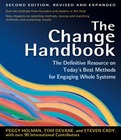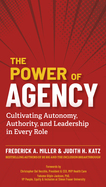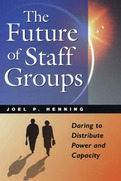2007
- Features descriptions of sixty-one change methods--up from eighteen in the first edition--and new chapters on selecting a method, mixing and matching methods, and sustaining results
- Describes every change method's essential concepts and processes and provides advice on when to use each
- Including ninety contributors, with many of the originators of the change methods described
2024
To help give employees the power, influence, and voice necessary to truly excel in their workplace, organizational development experts Miller and Katz reveal the importance of agency and offer practical advice on how to achieve it.
With more knowledge workers entering the workplace, many are being stifled by traditional employee-manager relationships that hamper their ability to fully contribute and feel engaged at work. And in a constantly changing and competitive world of work, organizations must evolve to keep up with worker satisfaction or else face a decrease in performance and loss in talent.
The solution? Enabling your employees to exercise their individual agency in the workplace. Through an actionable roadmap that highlights common pitfalls and practical steps necessary for establishing a culture of greater agency, this book will provide individuals, teams, managers, and leaders with concrete ways to clarify their current level of agency and identifies specific actions they can take to exercise greater agency.
Looked down on as functionaries by senior management and dismissed as roadblocks by their line group colleagues, corporate staff members have traditionally had only one surety--as overhead-identified costs, theirs are sure to be the first positions eliminated in any kind of crunch. Corporate staff have been the neglected resource in the overall corporate arsenal and Joel Henning makes a powerful argument that current market realities require that they can no longer be ignored.
The Future of Staff Groups takes the unusual tack of recognizing staff groups as the overlooked power brokers in corporations. It is an illuminating book about corporate staff groups within organizations--those that perform internal functions such as information systems departments, finance departments, human resource departments, quality departments, and so on--and the impact that they can have on the prosperity and success of the organizations they serve.
Competitive advantage in any of today's markets presumes competence. To go beyond competence to dominate a market, a company needs to know more, create more, learn faster, and communicate better than the competition. This is the work that corporate staff groups were born for -- not 'just to do', but to build within others the 'capability to do'--what Henning calls 'building capacity.'
Information systems groups retrieve, manipulate, format and distribute the information that drives the organization. The finance department identifies and processes the issues and resources upon which critical business decisions are based. Human resources determines the shape of the organization and how it will function. Building their capacities, and communicating them to colleagues in line groups dramatically improves the ability of the entire organization to serve the marketplace.
For this positive potential to be realized, Henning explains how and why the staff groups themselves first need to shed their own old roles and the mindset of carrying someone else's water --their traditional tasks of aligning, watching, mandating and caretaking. The Future of Staff Groups confronts the past, faces current bottom-line demands, and describes roles for the future that can effectively reposition staff groups within their organizations.
This book challenges both executive management and the staff groups in all types of public and private sector organizations to re-invent their roles and their impact on function and on profitability. It confronts staff groups with the need to take the first step in changing the agenda and the relationship they have with their corporate clients and colleagues. It further provides clear-cut steps that staff groups can take to develop new expertise that will have a clear impact on the results of the business.
The Future of Staff Groups focuses squarely on the substance and content of staff groups' contribution to the organization. Henning offers executives, and staff and line managers a new and vital vision for developing staff groups in organizations--a direction focused on personal accountability for their survival, contribution, and place at the table. It's a relevant reference for anyone who sells professional expertise and cares about their impact.
- Teaches staff groups-groups within organizations that perform internal functions such as human resources, finance, legal, quality, information systems, and others-how to shed old patterns and roles and speak directly to the concerns of their clients, their managers, and the groups themselves
- Tells stories that document the struggle to change staff groups both on a personal and an organizational level
- Provides a viable alternative to eliminating or outsourcing corporate staff functions
Do you want the key to driving equity and skyrocketing profits? It's simple: hand over control to your workers.
Discover 9 strategies to create better, healthier workplaces, grounded in evidence-based research.
This revolutionary guide aims to revolutionize the workplace for justice, equity, and profitability by handing the reins over to the real drivers of success: the workers.
Based on research from over 1,200 companies, including WalMart, Google, and JPMorgan Chase, this book follows real-world cases from companies where employees evolved from silent contributors to masterminds steering corporate strategies. These cases are the vanguard of a vibrant era in which workers will be the architects of their destinies, shaping not just their own careers but the entire trajectories of their organizations. Her work has quantified the financial impact investing in people can have on an organization- the first reliable calculation in the literature of talent retention.
From this research, 9 key strategies emerged:
•Centering employee voices
•Mutualistic working relationships
•Intersectional inclusion strategies
•Reimaging employee benefits
•Frontline leader driven strategies
•Hire STARS
•Develop deep talent benches
•Human capital reporting as a competitive strategy
•Distributed leadership
This book goes deeper to show how these strategies are working in the real-world today. When workers have stakes, everyone scores: businesses surge, and teams ride a high they've never felt before. This is a win-win proposition: both management and labor win when you put people first.
The money myths end here.
We don't need to choose between creating meaningful wealth for ourselves and our families today, or supporting social movements creating a better tomorrow. We don't all need to become certified financial "experts" to be economically empowered and make a real difference in our communities. And we're far from powerless when it comes to changing the financial system, just because we don't happen to belong to the 1%. Quite the opposite.
Financial activism is how everyday people radically reimagine money as a tool for widespread well-being, instead of a weapon of absurdly increasing inequality. It's the antidote to traditional finance that evokes confusion, trauma, and (in the best-case scenario) straight-up boredom. It's how we-the underestimated-collectively resist systems that cause harm to people and the planet for the sake of profit, reclaim wealth that's been stolen, and redesign our relationships with capital and one another, in ways big and small.
Going beyond tried financial literacy, The Financial Activist Playbook offers eight accessible, actionable, "choose-your-own-adventure" strategies for readers to experiment with. Drawing on timely insider knowledge from the worlds of impact investing, social justice, and more, Rashid illuminates a treasure trove of stories: demonstrating how people power can flow big bucks out of extractive industries, and into the economy of care and abundance we deserve.
Playbook readers will be equipped to start visualizing and influencing the unique networks of wealth all around each of us, with strategies like
- Shifting collective budgets and bank dollars;
- Flexing our role as everyday philanthropists;
- Leveraging the magic of community investment;
- And so much more.
2025
Drawing from decades of work with global organizations, military commanders, and NASA leaders, Jeff and Staney DeGraff reveal how true transformation emerges not from avoiding contradictions, but from embracing them.
This groundbreaking book, the third installation in their comprehensive innovation series, introduces a revolutionary framework for understanding and leveraging paradox. Through rich storytelling and battle-tested strategies, the DeGraffs unpack seven fundamental contradictions that define transformative growth:
How do we achieve more by doing less? Why does certainty often lead to failure, while embracing uncertainty paves the path to breakthrough? When does resistance become the catalyst for change? The Art of Change demonstrates how these seeming contradictions hold the key to profound transformation—both personally and professionally.
This isn't just another business book—it's a practical philosophy for navigating complexity in dynamic environments. Whether you're leading a Fortune 500 company, steering a nonprofit through turbulent times, or seeking personal growth, you'll discover:
- A proven framework for turning obstacles into opportunities
- Practical tools for making better decisions in ambiguous situations
- Strategies for building resilience through embracing paradox
- Methods for driving innovation by challenging conventional wisdom
- Techniques for leading transformational change in any environment
Don't just manage change—master it. Learn how to transform paradoxes into breakthroughs and turn uncertainty into your greatest advantage. The Art of Change is your essential guide to navigating the contradictions that define our era and achieving lasting transformation in an increasingly fluid world.

























